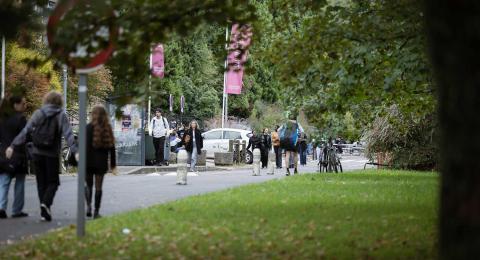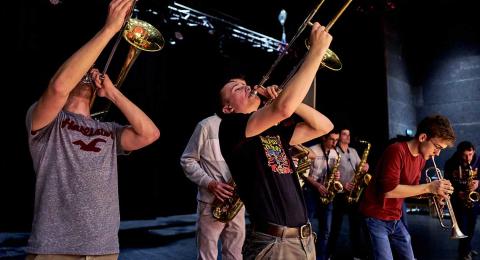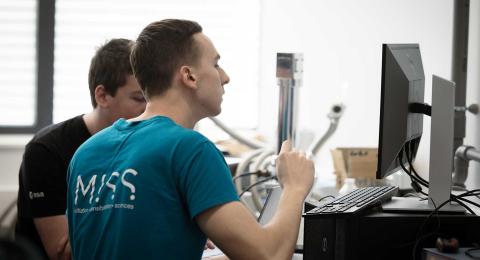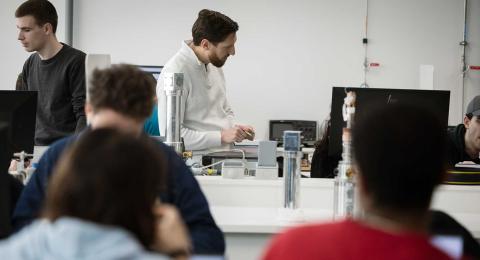The M1 “History, Economics, Societies, Heritage: Research and Valorization” (M1 HESP-ReV), the first year of a two-year program, is aimed at history students who wish to pursue either a traditional course of study in economic and social history, in the broadest sense, or a professional course of study in history applied to the promotion of the heritage of companies, administrations, or associations (Public History).
The M1 HESP-ReV is aimed at students who wish to pursue either a traditional research career in economic and social history (in the broadest sense) or a professional career in history applied to the enhancement of the tangible and intangible heritage of companies, administrations, or associations (Public History). The program draws on the expertise of a research unit, IDHES, dedicated to the study of social dynamics from antiquity to the present day. In the first semester, the core curriculum is generalist: seminars cover the four periods of history and cross-disciplinary subjects (languages, digital humanities, etc.). In the second semester, students confirm their chosen path, research or promotion. At the end of the year, they must produce a preparatory document: a research project (interim thesis) or a promotion report. Its quality determines whether they can progress to M2.
Information
Skills
Analyze historical and geographical dynamics to understand a social context and spatial changes.
Select relevant elements from a complex set of information to answer a question.
Produce acceptable information in a scientific context.
Communicate information to various audiences.
Act individually and collectively within a work group.
Objectives
- Upon completion of the program, students in the “research” track will have been trained in research through research. They will have acquired solid skills in terms of:
- problematization of a historical research topic: development, bibliographic review, issues, working hypotheses, methodology;
- identifying, analyzing, and exploiting multiple sources: written, iconographic, and audiovisual archives, oral testimonies, archaeological traces, architectural or museological heritage;
- organizing and structuring data: indexing, digitization, documentary files;
- writing scientific documents: articles, reports, dissertations;
- oral presentations. - The “ enhancement” track will have trained professional generalist historians who are able to research, identify, analyze, exploit, and enhance the heritage of public bodies and private or associative enterprises, with a view to applied history (public history) at the request of the communication departments of economic, social, and territorial institutions.
- Their profile is that of versatile historians who have mastered the scientific criteria of the historical discipline and are sensitive to the expectations of institutional communication; trained in research methods, capable of implementing a scientific process of source and data collection and archiving, able to produce relevant content, and skilled in techniques for promoting tangible and intangible heritage (documentation, publishing, museography, 3D modeling, exhibitions, communication).
Career Opportunities
Career prospects
Médiateur scientifique
Doctorant
Journaliste
Chargé de communication
Médiatrice et journaliste scientifique
Professeur des écoles
Après un master : Chargé(e) d’études
Après Master + Doctorat : chercheur ou enseignant-chercheur
Archiviste
Chargé d’actions et de médiations culturelles
Chargé de projet culturel
chargé de valorisation culturelle
chargé d'événementiel culturel
Chargé·e d’études
Consultant·e
Ingénieur d’études dans les domaines de la recherche
enseignant.e-chercheur.se (après un doctorat)
Enseignant.es dans le secondaire
Ingénieur.e d’études
journaliste culturel.le
métiers de la culture
Métiers de la médiation culturelle
métiers de la recherche
métiers de l'écrit et de la création
Records manager
rédacteur.rice spécialisé.e
Responsable de service culturel
Further Study Opportunities
Concours administratifs
Chargé·e d’études
Chef·fe de projet/de mission
Consultant·e
Ingénieur d'études
Les étudiants titulaires d’un M2 ont la possibilité de poursuivre dans la recherche en doctorat
Fees and scholarships
The amounts may vary depending on the programme and your personal circumstances.
Admission Route
Capacity
Available Places
Target Audience and Entry Requirements
History degree or equivalent. Good level of written and oral expression. Regular reading, solid grounding in general and historical culture, intellectual curiosity, ability to synthesize and analyze, strong work capacity. Acceptance of the conditions of scientific reflection (distancing, critical approach, free examination, respect for rules of method). For the history applied to heritage enhancement track, good command of information and communication technologies.
Supporting documents
Compulsory supporting documents
Motivation letter.
Research project.
All transcripts of the years / semesters validated since the high school diploma at the date of application.
Certificate of French (compulsory for non-French speakers).
Curriculum Vitae.
Detailed description and hourly volume of courses taken since the beginning of the university program.
Additional supporting documents
VAP file (obligatory for all persons requesting a valuation of the assets to enter the diploma).
Recommendation letters.
Supporting documents :
- Residence permit stating the country of residence of the first country
- Or receipt of request stating the country of first asylum
- Or document from the UNHCR granting refugee status
- Or receipt of refugee status request delivered in France
- Or residence permit stating the refugee status delivered in France
- Or document stating subsidiary protection in France or abroad
- Or document stating temporary protection in France or abroad.









